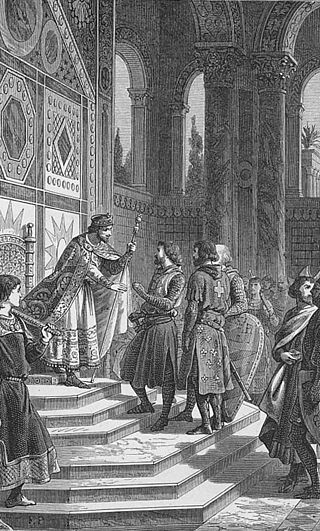John Eustace is an English footballer.
John Eustace may also refer to:

Eustace III was the count of Boulogne from 1087 succeeding his father, Eustace II. He joined the First Crusade, being present at Nicaea, Dorylaeum, Antioch, and Jerusalem. After fighting in the battle of Ascalon, he returned home. Initially offered the Kingdom of Jerusalem, Eustace was at Apulia when he received news of Baldwin of Bourcq's election to the throne. On his return to Boulogne, he founded a Cluniac monastery in Rumilly, retired as a monk, and died in 1125.

Caerlaverock Castle is a moated triangular castle first built in the 13th century. It is located on the southern coast of Scotland, eleven kilometres south of Dumfries, on the edge of the Caerlaverock National Nature Reserve. Caerlaverock was a stronghold of the Maxwell family from the 13th century until the 17th century, when the castle was abandoned. It was besieged by the English during the Wars of Scottish Independence, and underwent several partial demolitions and reconstructions over the 14th and 15th centuries. In the 17th century, the Maxwells were created Earls of Nithsdale, and built a new lodging within the walls, described as among "the most ambitious early classical domestic architecture in Scotland". In 1640 the castle was besieged for the last time and was subsequently abandoned. Although demolished and rebuilt several times, the castle retains the distinctive triangular plan first laid out in the 13th century. Caerlaverock Castle was built to control trade in early times.

The Silver Chair is a children's fantasy novel by C. S. Lewis, published by Geoffrey Bles in 1953. It was the fourth published of seven novels in The Chronicles of Narnia (1950–1956); it is volume six in recent editions, which are sequenced according to Narnian history. Like the others, it was illustrated by Pauline Baynes and her work has been retained in many later editions.

Eustace Clarence Mullins Jr. was an American white supremacist, antisemitic conspiracy theorist, propagandist, Holocaust denier, and writer. A disciple of the poet Ezra Pound, his best-known work is The Secrets of The Federal Reserve, in which he alleged that several high-profile bankers had conspired to write the Federal Reserve Act for their own nefarious purposes, and then induced Congress to enact it into law. The Southern Poverty Law Center described him as "a one-man organization of hate".

Eustace, also rendered Eustis, is the rendition in English of two phonetically similar Greek given names:
John Jameson may refer to:
Eustace I Granier, also known as Eustace Grenier or Eustace Garnier, called in Latin Eustachius Granarius in the charters, was a Flemish crusader who took part in the First Crusade. He became lord of Caesarea in 1101 and lord of Sidon in 1110. On 18 April 1123, he was elected constable and bailiff of Jerusalem during the captivity of Baldwin II of Jerusalem. Shortly before his death, he defeated a Fatimid army at the Battle of Yibneh near Ibelin.
Eustace Grenier is quoted in a text in verse written during his life in honour of the knights of the diocese of Thérouanne who accompanied Baldwin of Boulogne to the Holy Land.
Contemporary authors and historians identify Eustace Grenier as a nobleman from the diocese of Thérouanne in the County of Saint-Pol. Alan V. Murray, historian of the Crusades, writes: "However, his origins can be established with a high degree of certainty. The Versus de viris illustribus diocesis Tarvanensis qui in sacra fuere expeditione identifies him as a Fleming from the diocese of Therouanne".
Eustathius or Eustathios is a Greek masculine given name, in English rendered Eustace. It may refer to:

John Mark Eustace is an English professional football coach and former player who is head coach of EFL Championship club Birmingham City.
Sir Maurice Eustace, Baronet was an Irish gentleman, the only holder of the Eustace Baronetcy of Castle Martin in County Kildare, which was created for him in the Baronetage of Ireland on 23 December 1685.

Alfred Charles Eustace Jarvis was an eminent Anglican priest in the 20th century.
Maurice Eustace may refer to:
William de Vesci was the son of Eustace fitz John, who died in 1184.
James Blackwell may refer to:

Eustace Street is a street in the Temple Bar area of Dublin, Ireland.
FitzJohn was a bus manufacturer in Muskegon, Michigan, United States.

Straight Outta Nowhere: Scooby-Doo! Meets Courage the Cowardly Dog is a 2021 American animated comedy film produced by Warner Bros. Animation, and is the thirty-sixth entry in the direct-to-video series of Scooby-Doo films. The film is a crossover between Scooby-Doo and the Cartoon Network show Courage the Cowardly Dog, since the series ended in 2002, followed by a CGI short in 2014. The film was released on DVD and Digital on September 14, 2021.
Bishop Eustace may refer to:
General McCulloch may refer to:
John Skey Eustace was a revolutionary soldier, colonel of the Continental Army (1781), a merchant in tobacco and an american general (marechal-de-camp), briefly in French service between 1792 and 1793. In 1794/5 he supported the Batavian revolution. He regularly published his official and private correspondence but was regarded as a political adventurer and having a doubtful purpose and character. John Skey was close to many of the Founding Fathers.